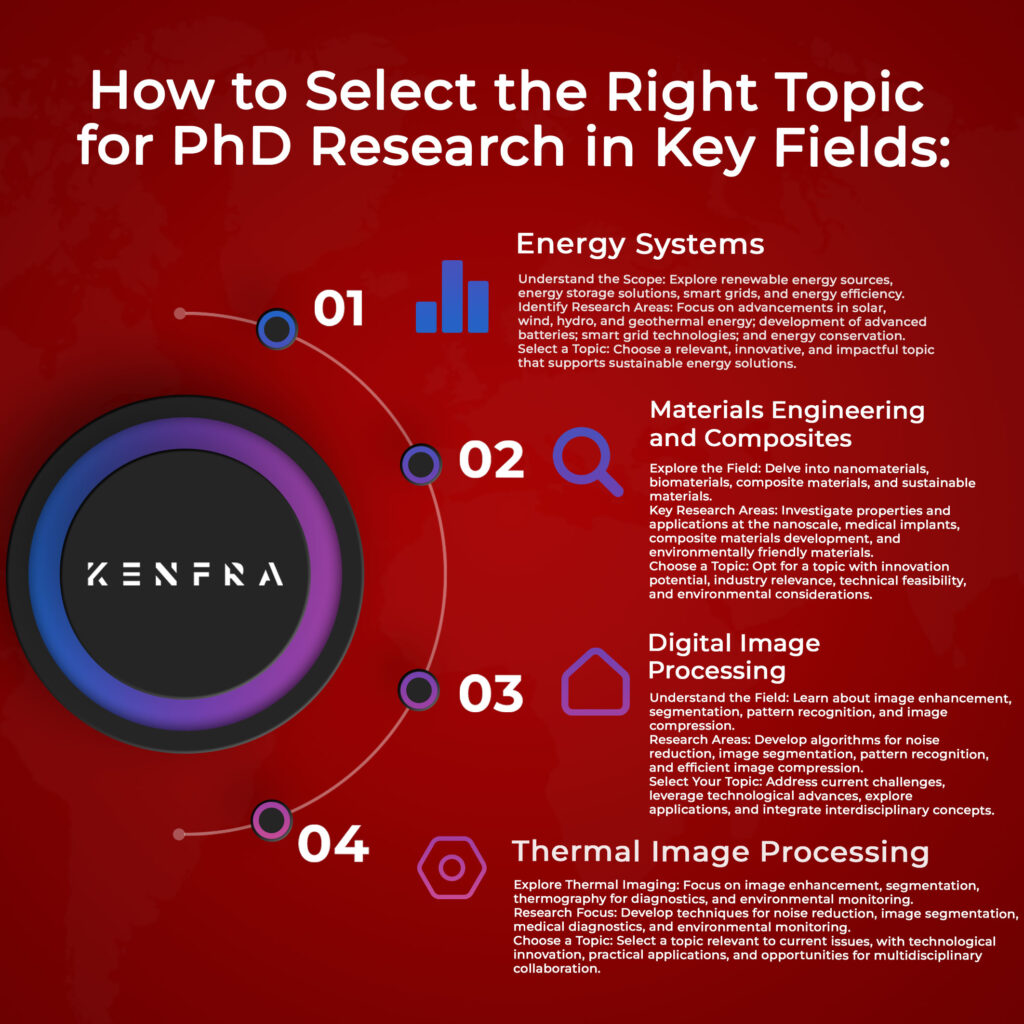How to Select the Right Topic for PhD Research in Key Fields
Kenfra2024-08-13T11:04:55+05:30Learn how to Select the Right Topic for PhD Research in Key Fields
Choosing the right topic for your PhD research is a pivotal decision that can significantly influence the trajectory of your academic and professional career. This article provides a comprehensive guide to selecting the ideal topic for PhD research in Energy Systems, Materials Engineering and Composites, Digital Image Processing, and Thermal Image Processing. By following these guidelines, you will be well-equipped to embark on a research journey that is both fulfilling and impactful.
Energy Systems
Understanding the Scope of Energy Systems
The field of Energy Systems encompasses a wide range of sub-disciplines, including renewable energy sources, energy storage solutions, smart grids, and energy efficiency. Given the global emphasis on sustainable energy solutions, selecting a topic in this field can have substantial societal impact.
Identifying Key Research Areas
- Renewable Energy Sources: Investigate the latest advancements in solar, wind, hydro, and geothermal energy. Explore innovative technologies that enhance efficiency and reduce costs.
- Energy Storage Solutions: Focus on the development of advanced batteries, supercapacitors, and other energy storage systems. Consider the integration of these solutions with renewable energy sources.
- Smart Grids: Research the implementation of smart grid technologies that optimize energy distribution and consumption. Examine the role of artificial intelligence and machine learning in smart grid management.
- Energy Efficiency: Study methods to improve energy efficiency in residential, commercial, and industrial settings. Analyze policies and practices that promote energy conservation.
Selecting a Research Topic
When selecting a research topic in Energy Systems, consider the following:
- Relevance: Ensure the topic addresses current challenges and opportunities in the field.
- Innovation: Seek topics that offer potential for groundbreaking discoveries or significant advancements.
- Feasibility: Assess the availability of resources, data, and expertise to support your research.
- Impact: Choose a topic that has the potential to contribute to sustainable energy solutions and societal well-being.
Materials Engineering and Composites
Exploring the Field of Materials Engineering and Composites
Materials Engineering and Composites is a dynamic field that focuses on the development and application of new materials with enhanced properties. This field plays a crucial role in various industries, including aerospace, automotive, construction, and electronics.
Key Research Areas in Materials Engineering
- Nanomaterials: Investigate the properties and applications of materials at the nanoscale. Explore the potential of nanomaterials in electronics, medicine, and environmental remediation.
- Biomaterials: Study materials designed for medical applications, such as implants, prosthetics, and drug delivery systems. Examine the biocompatibility and functionality of these materials.
- Composite Materials: Research the development of composite materials that combine different substances to achieve superior properties. Focus on applications in aerospace, automotive, and construction industries.
- Sustainable Materials: Explore the creation and use of materials that are environmentally friendly and sustainable. Consider the lifecycle and recyclability of these materials.
Selecting a Research Topic
When selecting a research topic in Materials Engineering and Composites, consider the following:
- Innovation Potential: Choose topics that offer opportunities for pioneering research and development.
- Industry Relevance: Ensure your research aligns with the needs and trends of relevant industries.
- Technical Feasibility: Evaluate the availability of equipment, materials, and expertise required for your research.
- Environmental Impact: Consider the sustainability and environmental implications of your research.
Digital Image Processing
Understanding Digital Image Processing
Digital Image Processing involves the manipulation and analysis of digital images using computational techniques. This field has applications in various domains, including medical imaging, remote sensing, security, and entertainment.
Key Research Areas in Digital Image Processing
- Image Enhancement: Develop algorithms to improve the quality of digital images. Focus on techniques such as noise reduction, contrast enhancement, and edge detection.
- Image Segmentation: Research methods to partition images into meaningful regions for analysis. Explore applications in medical imaging, object recognition, and computer vision.
- Pattern Recognition: Study algorithms for identifying patterns and features in digital images. Consider applications in facial recognition, biometrics, and surveillance.
- Image Compression: Investigate techniques to reduce the size of digital images without compromising quality. Examine the trade-offs between compression efficiency and image fidelity.
Selecting a Research Topic
When selecting a research topic in Digital Image Processing, consider the following:
- Current Challenges: Address pressing issues and challenges in the field.
- Technological Advances: Leverage recent advancements in artificial intelligence, machine learning, and deep learning.
- Application Potential: Choose topics with significant applications in industry and academia.
- Interdisciplinary Approach: Consider topics that integrate concepts from computer science, mathematics, and engineering.
Thermal Image Processing
Exploring Thermal Image Processing
Thermal Image Processing involves the analysis of thermal images, which capture the heat emitted by objects. This field has applications in areas such as medical diagnostics, industrial inspection, surveillance, and environmental monitoring.
Key Research Areas in Thermal Image Processing
- Thermal Image Enhancement: Develop techniques to improve the quality of thermal images. Focus on noise reduction, contrast enhancement, and image fusion.
- Thermal Image Segmentation: Research methods to segment thermal images for analysis. Explore applications in medical imaging, industrial inspection, and environmental monitoring.
- Thermography for Diagnostics: Investigate the use of thermal imaging for medical diagnostics. Study the detection of conditions such as inflammation, tumors, and vascular disorders.
- Environmental Monitoring: Explore the application of thermal imaging in monitoring environmental conditions. Focus on the detection of heat patterns, temperature anomalies, and wildlife observation.
Selecting a Research Topic
When selecting a research topic in Thermal Image Processing, consider the following:
- Relevance to Current Issues: Address important and emerging issues in the field.
- Technological Innovation: Utilize cutting-edge technologies such as machine learning and artificial intelligence.
- Practical Applications: Choose topics with real-world applications and potential for commercialization.
- Multidisciplinary Collaboration: Consider topics that involve collaboration with experts from other fields such as medicine, environmental science, and engineering.
Selecting the right topic for your PhD research is crucial to your success. By focusing on areas that are relevant, innovative, feasible, and impactful, you can make a significant contribution to your chosen field and advance your academic and professional goals. For more detailed information on various research domains, you can visit Kenfra Research Domains.
For personalized assistance in selecting the right topic, contact Kenfra Research









Leave a Reply